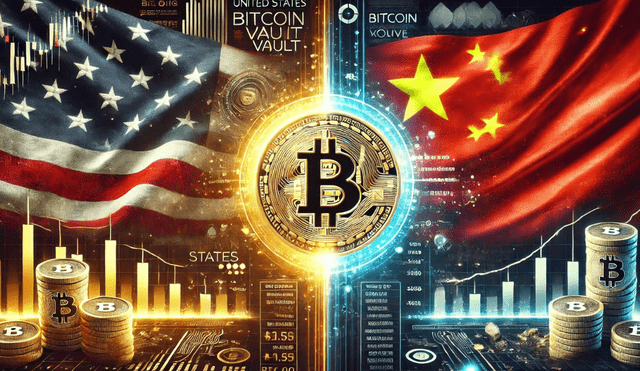United States vs. China: The Race for the Largest Bitcoin Reserve
Both nations understand the strategic potential of Bitcoin in the face of inflation and banking distrust. The possibility of a "Strategic Bitcoin Reserve" in the U.S. reflects this growing interest.
- Bitcoin Mining: How Nation-States Can “Print” Dollars Cheaper Than the Federal Reserve
- U.S. Moves Toward a Strategic Bitcoin Reserve with Lummis’ Bill

The global financial landscape is being redefined, and the battlefield is no longer just the dollar or the yuan—it’s Bitcoin. A viral image suggests that the U.S. and China are competing to accumulate strategic Bitcoin reserves, with figures of 198,109 BTC and 190,000 BTC, respectively. While these numbers may not be official, they reflect an undeniable reality: Bitcoin has become a geopolitical asset.
The Interest of Global Powers in Bitcoin
Government stances on Bitcoin have shifted dramatically in recent years. China, which banned Bitcoin mining in 2021, still holds significant reserves, mainly from seizures in legal cases such as the PlusToken scam. The U.S., on the other hand, has accumulated Bitcoin primarily through confiscations linked to illicit activities, such as Silk Road, and has recently hinted at a potentially more active strategy.
Bitcoin as a Strategic Reserve
Both nations understand that Bitcoin is not just a speculative asset but a tool of financial power. In a world of rising inflation, growing distrust in the banking system, and geopolitical tensions, holding large amounts of Bitcoin provides a strategic advantage.
China has focused on developing its digital yuan and expanding its dominance in global trade, while in the U.S., figures like Donald Trump have started publicly acknowledging Bitcoin’s importance. The idea of a “Strategic Bitcoin Reserve” in the U.S. has been discussed in political and financial circles.
Toward a Financial Cold War?
If these figures reflect reality, we may be witnessing a new form of competition between global powers, where Bitcoin is the latest piece on the geopolitical chessboard. Bitcoin’s decentralization prevents any state from monopolizing it, but mass adoption and reserve accumulation could influence the global economy.
One thing is certain: Bitcoin is no longer just a technological experiment—it has become a key element of global power.